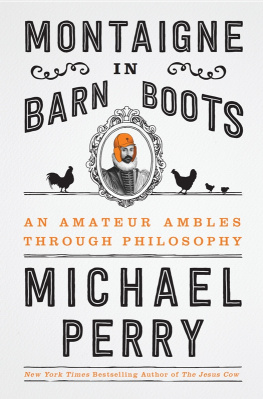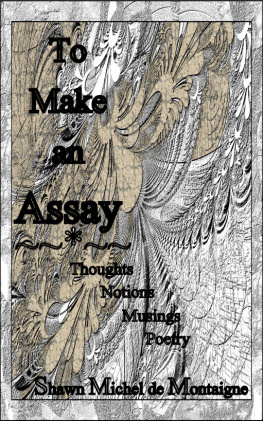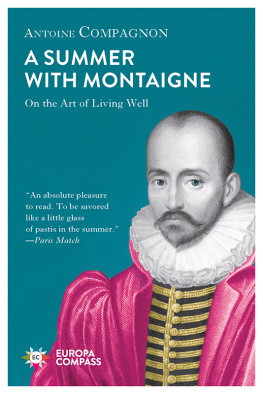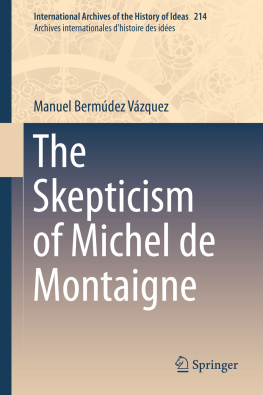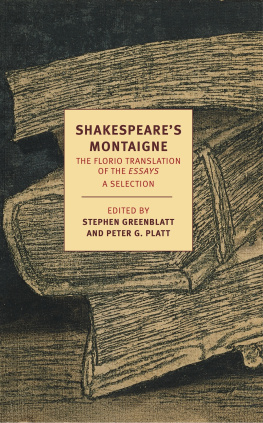When I quote Montaigne I quote his translators. They constitute multitudes. Here and there I will allude to the specific translation. Mostly I will not. A decidedly non-academic catch-all of my sources is included at the end of this book.
I recently tested an electrified pig fencer by grabbing it with my bare hands. As the fibrillations dispersed, I regarded the unitnow pulsing in the grass some fifteen feet distant, where it landed after I spastically flung itdumbly, then resolved to take the rest of the afternoon off and curl up with the late Michel de Montaignes essay Of the Inconsistency of Our Actions.
* * *
If you recognize the name Michel de Montaigne, you have a head start on me. If you dont recognize the name Michel de Montaigne, well, neither did I, at least not until I birthed my first kidney stone. The journey began on a gurney, whereupon I flopped all sweaty and stricken, the stone putting me through the sort of contortions your leading yogis only dream of. I was self-insured, with a catastrophic health plan that allowed me to pay for one ambulance ride, two emergency room visits, and some excellent drugsall out of my own pocket. It might have been entrepreneurial tenacity in the face of a four-figure deductible, or it might have been the intravenous Toradol, but at some point while prostrate in a penniless Percocet haze, I had a vision that I might convert my agony into cash by writing a personal essay about the experience. I started taking notes, and kept taking them until the moment two weeks later when I peed out what appeared to be the Devils own gobstopper.
Next I set out to bolster my personal observations by reading several medical journal articles on the subject of renal calculi. A number of authors referenced a sixteenth-century French noblemanMichel de Montaigne, born in 1533who had documented his own kidney stone experience. I looked him up. Bought his book. Read the kidney stone excerpts. Then I got drawn into his essay about thumbs. And then I read the one about the sexual danger of coaches (the kind with horses, not the kind with bad shorts and whistles). And another about cannibalism. And the one about marriage. And flatulence. The guy would write about anything.
I discovered it is generally agreed that Michel de Montaigne invented the essay form, for which I thank him, as it allowed me to convert our shared affliction into cash. But after my kidney stone essay was published, I kept reading Montaigne. Fits and starts, bits and pieces, here and there, but Ive never really stopped. All thanks to a crippling pain in my flank.
* * *
Last evening near midnight I was called away from the keyboard to help fight a fire. The flames roared and spit sky-high as we pulled hose, the house as good as gone even as it stood. I had been writing on deadline, with a newspaper column due come morning. As my neighbors home boiled into ash, the clickety-click musings Id been stitching together evaporated to irrelevance in a flash.
Over the course of my years I have deployed hundreds of thousands of words, primarily in pursuit of next months house payment. I draw from my heart, but my eye is always on the mortgage. As a writer I can neither claim nor hold the intellectual high ground. Having closely observed great writers and great fires, I know: My keystrokes are short-lived sparks sent flittering into the void, my books a match struck in a monsoon. When I leave this life my most meaningful acts will have been performed not at the writing desk but at the behest of a volunteer fire department pagerand even then I am frequently party to a team presiding over defeat.
Montaigne once wrote, Good God, My Lady, how I would hate the reputation of being clever at writing but stupid and useless at everything else! Yeah, buddy. Every time my old snowplow truck wont start, I lift the hood, understand nothing, and long for some fourth dimension where it is possible to replace a bad starter with a nifty simile.
I come from a family of eminently practical people, most of them equipped to perform fundamental functions along the lines of heavy machinery operation, projects involving electricity (on purpose), the design and production of roads and basements and cellphone cases and hay bales, military service, and so on. Whereas I peddle words and three-chord songs.
When blue collar is your background, you never lose the idea that unless you can stack it or stack with it, it doesnt count. (A stack of books? Dubious.) Michel de Montaigne once cast words and language as a merchandise so vulgar and vile that the more a man has the less he is probably worth. And yet he spent the last twenty-two years of his life cranking out reams of that very merchandise.
Thank goodness.
Based on our backgrounds, I wouldnt expect to find much in common with Michel de Montaigne. He is permanently deceased in France; I am temporarily alive in Wisconsin. He was a nobleman born to nobility; I was born to a paper mill worker and a nurse. He was privately tutored in Latin from the age of two and enrolled in the University of Toulouse to study law when he was fourteen; I matriculated as a barn-booted bumpkin who still marks a second-place finish in the sixth-grade spelling bee as an intellectual pinnacle. He served with the military, held several high-level government positions, roamed around Europe, and hung out with the Pope; I am on the volunteer fire department, had a brief run on the student council, went hitchhiking in 1989, and once said hello to Merle Haggard.
And heres where the trail really splits: at the age of thirty-eight, Montaigne retired to the family estate, desiring, as he put it, to spend the rest of his days in the bosom of the learned virgins.
Gosh, I wish Id have thought of that.
From then until he kicked the bucket, Montaigne composed essays while ensconced in a castle tower overlooking his vineyards.
I typed that sentence while ensconced in a room above the garage overlooking a defunct pig pen.
Over the course of 107 essays, Montaignes writing wrassled with humankinds universal biggiesfreedom, power, religion, the nature of existenceand he regularly supplemented his observations with quotes from the likes of Homer, Cicero, and Lucretius. But he also left us with his introspections on drunkenness, radishes, hairstyles, impotence, aromatherapy, politics, and kinky sex. In the words of Terence Cave, author of How to Read Montaigne, Montaigne wrote with no evident centre of gravity.
I know the feeling. But this does not excuse me from searching for that centre. Ta-Nehisi Coatesa man whose writing does not flittersays his only real responsibility as a writer is to... interrogate my own truths. The vibe of that line reminded me of Montaignes observation that a man wishing to address his own contradictions must look narrowly into his own bosom. Cross-referencing Coates with Montaigne yields something simple enough: claiming I write simply to pay the rent doesnt excuse me from the duty of writing to be a better personand not just for my own sake, and certainly not because the world breathlessly awaits, but for specific and powerful reasons including my neighbors and the future of my children. I need to be a better citizen. It is my duty to look narrowly into my own bosom and interrogate my own truths. To clarify my character while meandering in the medium of those essais

